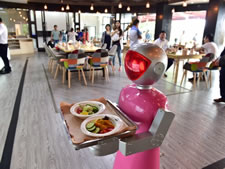Republican-Leaning Cities Are At Greater Risk Of Job Automation
 By Jed Kolko for Five Thirty Eight: More and more work activities and even entire jobs are at risk of beingautomated by algorithms, computers and robots, raising concerns that more and more humans will be put out of work. The fear of automation is widespread — President Obama cited it as the No. 1 reason Americans feel anxious about the economy in his State of the Union address last month — but its effects are not equally distributed, creating challenges for workers and policymakers. An analysis of where jobs are most likely to face automation shows that areas that voted Republican in the last presidential election are more at risk, suggesting that automation could become a partisan issue.
By Jed Kolko for Five Thirty Eight: More and more work activities and even entire jobs are at risk of beingautomated by algorithms, computers and robots, raising concerns that more and more humans will be put out of work. The fear of automation is widespread — President Obama cited it as the No. 1 reason Americans feel anxious about the economy in his State of the Union address last month — but its effects are not equally distributed, creating challenges for workers and policymakers. An analysis of where jobs are most likely to face automation shows that areas that voted Republican in the last presidential election are more at risk, suggesting that automation could become a partisan issue.
So-called “routine” jobs — those that “can be accomplished by following explicit rules” — are most at risk of automation. These include both “manual” routine occupations, such as metalworkers and truck drivers, and “cognitive” routine occupations, such as cashiers and customer service reps.1 Whereas many routine jobs tend to be middle-wage, non-routine jobs include both higher-wage managerial and professional occupations and lower-wage service jobs. Cont'd...
Featured Product

